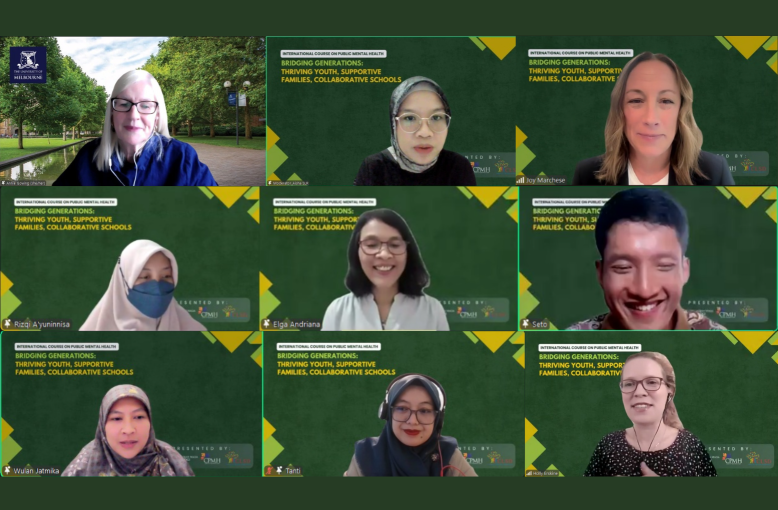
Mental health promotion across generations has become increasingly crucial in today’s rapidly changing world, especially for young people navigating complex family, educational, and digital environments. Responding to this global need, the Center for Public Mental Health (CPMH), led by Dr. Diana Setiyawati, M.HSc., Psikolog., in collaboration with the Center for Life-Span Development (CLSD), headed by Aisha Sekar Laziardi Rachmanie, M.Psi., Psikolog., – both under the Faculty of Psychology, Universitas Gadjah Mada (UGM), proudly held the International Course on Public Mental Health (ICPMH) 2025 with the theme “Bridging Generations: Thriving Youth, Supportive Families, Collaborative Schools”. This programme aimed to explore strategies for strengthening youth well-being through supportive family relationships, collaborative school engagement, and active community involvement.
The course was conducted online from 27 to 31 October 2025, preceded by an opening session on 23 October 2025. The opening featured a special “Livingroom Talks with Diana and Derin” – an engaging conversation between Dr. Diana Setiyawati, M.HSc., Psikolog., and Prof. Dr. Süleyman Derin on “Supportive Family for Youth Mental Health Development”. The discussion emphasised how families form the foundation of psychological well-being and how emotional connectedness and mutual support between parents and children can become powerful protective factor in mental health
Across ten sessions, the ICPMH invited experts from Indonesia, Malaysia, Australia, Türkiye, the United Kingdom, and the United States, including the representatives from UNICEF and leading universities, to share research insights and practical experiences. The programme was delivered in English with simultaneous Indonesian translation and was open to professionals, academicians, educators, parents, and the wider community. It provided a platform for dialogue between science and practice while reaffirming that the promotion of mental health requires shared commitment from everyone..
In the following sessions, A/Prof. Dr. Fonny Dameaty Hutagalung from the University of Malaya opened the week highlighting adaptive parenting that integrates cultural values with open communication. Tanti Kosmiyati Kostaman, S.Psi., M.Sc., discussed the role of communities in supporting youth mental health through sustainable local networks. A/Prof. Holly Erskine presented key findings from the Indonesian National Adolescent Mental Health Survey (I-NAMHS), calling for stronger school-based mental health systems and stigma reduction. Prof. Dr. Ir. Euis Sunarti underscored that families are essential partners, not passive observers, in mental health promotion – emphasising connection before correction.
Further sessions enriched the conversation with diverse perspectives: Teodora Pavkovic, M.Sc., Clin Psy., explored digital well-being and the shared responsibility of families and schools in guiding youth through the digital era. Dr. Elga Andriana, M.Ed., and Christopher Florensco Raditya Sadewa discussed inclusive education through co-design principles that empower youth with intellectual disabilities. Joy Marchese introduced Positive Discipline for educators and parents, focusing on empathy, respect, and self-regulation instead of punishment. Dr. Annie Gowing from the University of Melbourne shared trauma-informed practices that help schools and families foster safety and emotional healing. Finally, Dr. Fuad Hamsyah, M.Sc., concluded the course with reflections on the balance between career and caregiving, emphasising that resilience in families is built through shared responsibility and community support.
Through ten sessions of exchange and collaboration, the ICPMH 2025 demonstrated that mental health is not only an individual concern but a collective commitment that begins within families and extends into schools and communities. The initiative aligns with UGM’s dedication to advancing the Sustainable Development Goals, particularly SDG 3 on Good Health and Well-Being, by promoting evidence-based mental health practices that bridge generations and foster resilience. By connecting youth, parents, and educators across the world, ICPMH 2025 continues to strengthen the vision of a mentally healthy society where every individual can grow, learn, and thrive together.
Writer: Akmal Naseery, S.Psi., MSc.
